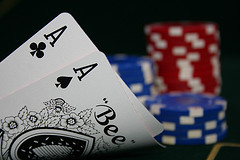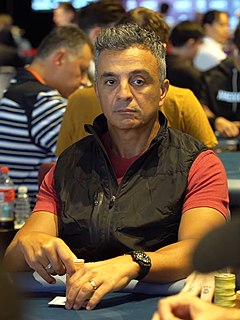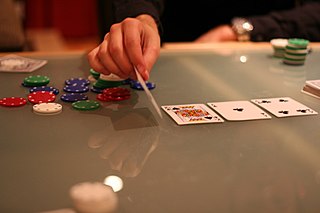
Poker is a family of comparing card games in which players wager over which hand is best according to that specific game's rules in ways similar to these rankings. While the earliest known form of the game was played with just 20 cards, today it is usually played with a standard deck, although in countries where short packs are common, it may be played with 32, 40 or 48 cards. Thus poker games vary in deck configuration, the number of cards in play, the number dealt face up or face down, and the number shared by all players, but all have rules that involve one or more rounds of betting.

Omaha hold 'em is a community card poker game similar to Texas hold 'em, where each player is dealt four cards and must make their best hand using exactly two of them, plus exactly three of the five community cards. The exact origin of the game is unknown, but casino executive Robert Turner first brought Omaha into a casino setting when he introduced the game to Bill Boyd, who offered it as a game at the Las Vegas Golden Nugget Casino. Omaha uses a 52-card French deck. Omaha hold 'em 8-or-better is the "O" game featured in H.O.R.S.E.
Five-card stud is the earliest form of the card game stud poker, originating during the American Civil War, but is less commonly played today than many other more popular poker games. It is still a popular game in parts of the world, especially in Finland where a specific variant of five-card stud called Sökö is played. The word sökö is also used for checking in Finland.
Seven-card stud, also known as Seven-Toed Pete or Down-The-River is a variant of stud poker. Until the recent increase in popularity of Texas hold 'em, seven-card stud was the most widely played poker variant in home games across the United States, and in casinos in the eastern part of the country. The game is commonly played with two to eight players, though eight may require special rules for the last cards dealt if no players fold. With experienced players who fold often, even playing with nine players is possible.

Texas hold 'em is one of the most popular variants of the card game of poker. Two cards, known as hole cards, are dealt face down to each player, and then five community cards are dealt face up in three stages. The stages consist of a series of three cards, later an additional single card, and a final card. Each player seeks the best five card poker hand from any combination of the seven cards; the five community cards and their two hole cards. Players have betting options to check, call, raise, or fold. Rounds of betting take place before the flop is dealt and after each subsequent deal. The player who has the best hand and has not folded by the end of all betting rounds wins all of the money bet for the hand, known as the pot. In certain situations, a "split-pot" or "tie" can occur when two players have hands of equivalent value. This is also called a "chop-pot". Texas hold 'em is also the H game featured in HORSE and in HOSE.

A poker tournament is a tournament where players compete by playing poker. It can feature as few as two players playing on a single table, and as many as tens of thousands of players playing on thousands of tables. The winner of the tournament is usually the person who wins every poker chip in the game and the others are awarded places based on the time of their elimination. To facilitate this, in most tournaments, blinds rise over the duration of the tournament. Unlike in a ring game, a player's chips in a tournament cannot be cashed out for money and serve only to determine the player's placing.
Phillip Jerome Hellmuth Jr. is an American professional poker player who has won a record sixteen World Series of Poker bracelets. He is the winner of the Main Event of the 1989 World Series of Poker (WSOP) and the Main Event of the 2012 World Series of Poker Europe (WSOPE), and he is a 2007 inductee of the WSOP's Poker Hall of Fame. He is widely regarded as one of the greatest tournament players of all time.
Dealer's choice is a style of poker where each player may deal a different variant. As the deal passes clockwise around the table, each player occupying the dealer position chooses a variant which is either played just for the current hand or for an entire orbit. It is a common choice for home games, where the tone of the game is usually more recreational than competitive. It is also rarely played online, due to the complexities involved in creating the appropriate algorithms that would allow the format of poker to change during each hand, or orbit.

In Texas hold 'em, a starting hand consists of two hole cards, which belong solely to the player and remain hidden from the other players. Five community cards are also dealt into play. Betting begins before any of the community cards are exposed, and continues throughout the hand. The player's "playing hand", which will be compared against that of each competing player, is the best 5-card poker hand available from his two hole cards and the five community cards. Unless otherwise specified, here the term hand applies to the player's two hole cards, or starting hand.

Joseph Hachem is a Lebanese Australian professional poker player known for being the first Australian to win the World Series of Poker main event, which earned him $7.5 million, then a record for all-time biggest tournament prize.

The MANSIONPoker.net Poker Dome Challenge was a 43-week series of speed poker tournaments offering a grand prize of US$1,000,000. The tournament aired in the United States on Fox Sports Network from May 2006 to March 2007. The tournament featured a number of technological gimmicks in an effort to increase viewer interest and excitement. Commentating duties were shared by rotating hosts including Barry Tompkins, Jon Kelley, Michael Konik, Michael Gracz, Joel Meyers and Chris Rose with Leeann Tweeden serving as co-host/exit interviewer. Matt Savage was the tournament director.

Casino Hold'em is a casino gambling game. This banking game, introduced by Stephen Au-Yeung in 2000 and now played in live casinos worldwide. It was licensed for use in the United Kingdom in 2007. In addition online casinos offer the game, which is based on the traditional multi-player Texas Hold'em Poker.
Duplicate poker is a variant of the card game poker. Duplicate poker is based on the principles of duplicate bridge, but it also incorporates some of the rules of pot limit and no limit Texas hold'em.

Thomas Dwan Jr. is an American professional poker player who played online in the highest-stakes No-Limit Texas hold 'em and Pot-Limit Omaha games, primarily on Full Tilt Poker under the screen name "durrrr". Dwan has won prize money in live poker tournaments and has appeared on NBC's National Heads-Up Poker Championship, the fourth, fifth, sixth, and seventh seasons of Poker After Dark, the third, fourth, and fifth seasons of Full Tilt Poker's Million Dollar Cash Game, and the fifth, sixth, and eighth seasons of GSN's High Stakes Poker.
The following is a glossary of poker terms used in the card game of poker. It supplements the glossary of card game terms. Besides the terms listed here, there are thousands of common and uncommon poker slang terms. This is not intended to be a formal dictionary; precise usage details and multiple closely related senses are omitted here in favor of concise treatment of the basics.

Joseph Cada is an American professional poker player from Shelby Charter Township, Michigan, best known as the winner of the Main Event at the 2009 World Series of Poker (WSOP).
Poker is a popular card game that combines elements of chance and strategy. There are various styles of poker, all of which share an objective of presenting the least probable or highest-scoring hand. A poker hand is usually a configuration of five cards depending on the variant, either held entirely by a player or drawn partly from a number of shared, community cards. Players bet on their hands in a number of rounds as cards are drawn, employing various mathematical and intuitive strategies in an attempt to better opponents.

Community card poker refers to any game of poker that uses community cards, which are cards dealt face up in the center of the table and shared by all players. In these games, each player is dealt an incomplete hand face down, which are then combined with the community cards to make a complete hand. The set of community cards is called the "board", and may be dealt in a simple line or arranged in a special pattern. Rules of each game determine how they may be combined with each player's private hand. The most popular community card game today is Texas hold 'em, originating sometime in the 1920s.
Ultimate Texas Hold 'Em is registered trademark of Bally Gaming, Inc. and refers to a reinvented variant of the classic poker game Texas hold 'em. In this variation, the player does not compete against other players. Instead, they play only against the dealer. At any point during the course of the hand, the player is free to make one raise. In this poker-based game, the earlier the raise is made, the higher its value is.









